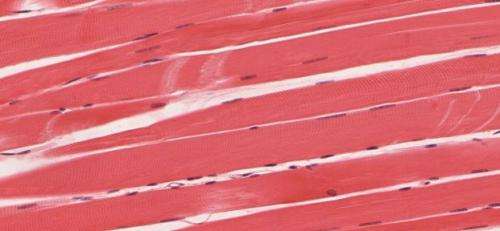Research finds a little exercise does a lot of good for ageing muscles

Getting old doesn't necessarily mean getting weak and frail – just a little bit of exercise can help maintain muscle mass and strength, Otago research has revealed.
Study lead author and University of Otago Ph.D. candidate Ashley Gillon says ageing is associated with reduction in both muscle size and strength (a condition known as sarcopenia).
As a driver of morbidity and mortality, the condition is fast becoming a growing health concern in our ageing population.
"Due to advancements in medical care people are living longer – half of the people born this century are expected to live to be 100. Although people are living longer, their lives are not necessarily healthy or independent due to drastic losses in strength and muscle function in advanced age," he says.
In a world-first, researchers set out to find why ageing eats away at muscles in order to learn how to slow that process down, and, ultimately, help develop countermeasures which will allow people to retain their strength and independence longer.
"We hope to challenge the notion that we have to accept that getting old means getting weak, frail and losing our independence," Mr Gillon says.
Using animal models, the team investigated the effect of age and exercise on muscles, with the aim of understanding any changes in relation to sarcopenia.
They found one intervention which protects muscle mass is exercise, though they are unsure what exactly it is about it that helps.
"It appears that both endurance and resistance training helps to preserve muscle and it's never too late to start.
"Our research showed that doing just a bit of exercise is really helpful for our nerves and muscles, we don't need to be running a marathon every day to get the benefit of being active – a little bit of extra activity can do a lot of good," Mr Gillon says.
The study also found nerve degeneration in normal ageing was similar, at a cellular level, to degeneration caused by specific neurodegenerative diseases, such as Alzheimer's and dementia.
"This raises interesting parallels between disease-mediated nerve cell death and age-mediated nerve cell death that we think may help inform new approaches to diseases as well as to ageing."
He describes the findings as both "exciting and encouraging'' and says the researchers are motivated to find out what it is about exercise that keeps nerves and muscles healthy.
"Because exercise is sometimes not a useful countermeasure for those who cannot be more active, we need to understand what it does to our nerves and muscles so maybe one day we can provide some of the benefits of exercise to people who are not able to do very much activity."
More information: Ashley Gillon et al. Exercise attenuates age-associated changes in motoneuron number, nucleocytoplasmic transport proteins and neuromuscular health, GeroScience (2018). DOI: 10.1007/s11357-018-0020-4

















